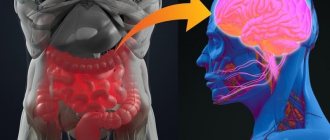Even in Greek philosophy and medicine, the idea of the influence of the soul and spirit on the human body was widespread. Translated from Greek, “psycho” means soul, and “soma” means body. The soul and body are inextricably linked - Hippocrates, Plato, Aristotle spoke about this. The term “psychosomatics” will soon be two hundred years old; it was coined in 1818 by the German physician Heinroth.
Psychosomatic diseases are diseases of internal organs and systems that arise as a result of mental ill-being.
Psychotherapists say: any disease first arises in the subconscious and only then manifests itself at the body level. That is, most of our ailments are associated with unresolved internal problems. The main psychological causes of illnesses are anger, envy, anxiety and guilt.
Many scientists believe that 80% of all diseases are actually psychosomatic. Our well-being depends on our thoughts, mood, ability to find and see positive things, beauty and enjoy it all. The state of health is associated with the ability to be happy, character traits, attitude to successes and failures at work, and everyday problems.
According to the psychoanalytic theory of Sigmund Freud, symptoms and diseases of various organs are a symbolic language with the help of which the body wants to communicate repressed mental conflicts.
Almost half of all human diseases can be psychosomatic in nature. Among them are diseases:
- heart and blood vessels (arterial hypertension, hypertension, rheumatism, vegetative dystonia, coronary heart disease, heart rhythm disturbances, heart attacks)
- gastrointestinal tract (peptic ulcer of the stomach and duodenum, ulcerative colitis, biliary dyskinesia)
- nervous system (chronic headaches, tension pain, dizziness)
- skin (neurodermatitis, relapses of psoriasis)
- gynecological, including those related to the woman’s reproductive cycle (premenstrual tension syndrome, gestosis, postpartum depression)
- endocrine
- and many others.
Symptoms of psychosomatic diseases
Sometimes doctors are faced with situations where it is not possible to accurately determine the cause of a particular disease. It happens that there are no physiological prerequisites for the development of the disease, but the disease progresses.
If medical examination cannot detect a physical or organic cause of the disease, or if the disease is the result of emotional states such as anger, anxiety, depression, guilt, then the disease is classified as psychosomatic.
There are certain signals that the cause of the disease lies precisely in the field of psychology:
- Frequent recurrence of the disease. The person receives treatment according to the doctor's recommendations, but eventually the symptoms disappear for a short time and soon reappear. That is, adequate drug treatment does not give the expected result.
- The presence of psychological trauma or chronic stress. If a patient knows that he has had a difficult period or something is wrong in his personal life, it is better to immediately contact both a therapist and a psychotherapist, which will help to quickly establish the true cause of the disease and select the right treatment.
- Traditional treatment does not help - another feature of psychosomatic illness.
Psychosomatics map (list):
Map of psychosomatics and diseases From the book “Psychosomatics: the most dangerous emotions” Author: Dr. Evdokimenko
You can ask me: “Tell me, doctor, why did you even need to make your own map of the psychosomatics of diseases, if there are many other psychosomatic maps - Louise Hay, Luule Viilma, Liz Burbo, and several other authors?”
I'll start with Louise Hay. I love her work very much and highly appreciate it. In addition, I generally like Louise Hay’s views and ideas very much. The only point is that Louise Hay, it seems to me, was a little lacking in purely medical knowledge. After all, she was not a doctor by training. Although she was an amazing healer of human souls.
Over the years of medical practice, I have accumulated many of my own observations and conclusions, and many of them are very different from the conclusions of Louise Hay... in general, I decided that it was time to structure my conclusions into my “author’s” map of the psychosomatics of diseases.
In some ways it is consonant with Louise Hay’s map, in some ways it is not. But in total, it seems to me that our work complements each other. And the works of other authors on this topic... We all do one big common thing - we tell people that our emotions are material, and our physical well-being and health largely depend on what feelings and emotions we experience at the mental level.
But small differences in our views and in our vision of the problem are normal. After all, let me remind you that Psychosomatics is a relatively young science, not yet fully formed. Therefore, the opinions of various psychologists and doctors on some aspects of the psychosomatics of individual diseases may differ to one degree or another.
Doctor Evdokimenko’s psychosomatics map - list of diseases:
Abscess, abscess Prostate adenoma Adnexitis, inflammation of the appendages in a woman Alcoholism, alcohol abuse Allergies in children and adolescents Allergies in adults Anemia, reduced hemoglobin Sore throat, throat diseases, chronic tonsillitis Arrhythmia, cardiac arrhythmia or tachycardia Arthritis, rheumatoid arthritis Arthrosis of the hip joints, coxarthrosis , lameness Aseptic necrosis of the femoral head, infarction of the hip joint Asthma: see Bronchial asthma Atherosclerosis, development of atherosclerotic plaques in blood vessels Autoimmune thyroiditis, Hashimoto's thyroiditis Infertility, problems with conception Insomnia, sleep disturbance Myopia, poor vision Plaques in blood vessels: see. Atherosclerosis Ankylosing spondylitis, ankylosing spondylitis Diseases of the knees: see Knees - arthrosis, gonarthrosis, knee deformity Diseases of young children Diseases of the right or left half of the body Alzheimer's disease, dementia, senile dementia, senile marasmus Parkinson's disease: see Parkinsonism Pain in the shoulder or shoulders Acute lower back pain (lumbar lumbago) Chronic lower back pain (aching pain) Lower back pain with lumbago in the leg - inflammation of the femoral or sciatic nerve Pain in the middle of the back and between the shoulder blades Pain in the neck Toothache Bronchial asthma Bronchitis: see Cough, see Shortness of breath Bruxism: see Grinding of teeth in sleep Varicose veins, varicose veins Sexually transmitted diseases: see Infection with sexually transmitted diseases or AIDS Inflammation of the eye: see Conjunctivitis Inflammation of the intestines, chronic and ulcerative colitis: see. Colitis Inflammation of the lungs, pneumonia Inflammation of the appendages in women: see. Adnexitis Inflammation of the trigeminal nerve: see Trigeminal neuralgia Hair loss on the head, baldness Sinusitis: see Runny nose, chronic rhinitis Gastritis, gastroenteritis and stomach ulcers Reduced hemoglobin: see. Anemia Herpes on the lips and genital herpes Hypertension, high blood pressure Hypothyroidism, low thyroid function Hypotension, low blood pressure Headache and migraine Dizziness Fungus on the legs Flu, colds or acute respiratory infections (ARVI) Herniated disc, intervertebral hernia: see Lower back pain acute and chronic Farsightedness, a person sees poorly near, but sees well at a distance (most often develops in old age) Depression Diabetes, diabetes mellitus types 1 and 2 Gallbladder, diseases: see Cholecystitis Constipation, poor bowel function Infections with sexually transmitted diseases or AIDS Heartburn , increased acidity of gastric juice Immunity: see. Reduced immunity, frequent colds Impotence, reduced potency in men, weak erection Stroke, acute cerebrovascular accident Myocardial infarction or angina pectoris: see Heart attack Curvature of the spine, scoliosis (but not stoop) Cataracts of the eye Cough Itchy skin; irritation of the skin, leading to the desire to scratch it Knees, their diseases - arthrosis, gonarthrosis, knee deformity Colitis, intestinal inflammation, stool disorder Conjunctivitis, inflammation of the eye Bleeding - nasal, vaginal, and others Laziness, laziness, laziness, reluctance to do something Excess weight, obesity, obesity, can’t lose weight Mastopathy or nodes in the chest in women Migraine: see Headache Uterine fibroids Thrush - candidiasis, fungal inflammation of the genital tract Runny nose, chronic rhinitis, as well as sinusitis or sinusitis Trigeminal neuralgia Neurodermatitis Baldness: see . Hair loss on the head Shortness of breath, difficulty breathing Obesity: see Excess weight, obesity, can’t lose weight Parkinsonism, Parkinson’s disease, shaking hands Periodontal disease, periodontitis, problems with gums or teeth Pyelonephritis, inflammation of the kidneys Food poisoning, coupled with nausea, vomiting or diarrhea Pneumonia: see Pneumonia Increased thyroid function, thyrotoxicosis, hyperthyroidism and autoimmune thyroiditis Increased sensitivity to smells or sounds Increased blood pressure: see. Hypertension Low blood pressure: see Hypotension Prostatitis, chronic prostatitis Colds: see Flu, colds or acute respiratory infections (ARVI) Acne, furunculosis Psoriasis Cancer, tumors, oncological diseases Diabetes mellitus: see Diabetes Heart attack: myocardial infarction and angina Irritable bowel syndrome, IBS Grinding of teeth in sleep, bruxism Scoliosis: see Curvature of the spine Reduced immunity, frequent colds Hearing loss, hearing loss Senile dementia: see Alzheimer's disease Stooping, poor posture, kyphosis, Scheuermann's disease Tonsillitis: see Sore throat, throat diseases Injuries and accidents Blood clots, thrombosis or thrombophlebitis Chest nodules in women: see. Mastopathy Cholesterol, high cholesterol Cholecystitis, gallbladder dyskinesia, cholelithiasis Lameness, intermittent claudication, obliterating endarteritis Cystitis, inflammation of the bladder Thyroid gland, diseases: - see Autoimmune thyroiditis - see Hypothyroidism, decreased thyroid function - see Increased thyroid function glands, thyrotoxicosis, hyperthyroidism and autoimmune thyroiditis Noise in the ears or head Eczema Endometriosis Enuresis, bedwetting in children Epilepsy Stomach ulcer: see Gastritis Duodenal ulcer Mouth ulcers, painful sores in the oral cavity Stye on the eye
Diagnosis of psychosomatic disorders
It’s rare that a doctor will immediately suspect a patient is psychosomatic. Typically, such diseases do not differ in appearance from somatic diseases; for example, it is never possible to immediately determine whether a patient’s gastritis is caused by the Helicobacter bacterium or some kind of experience. Very often, doctors diagnose problems with the gastrointestinal tract, cardiovascular system, nervous system or immunity, without even knowing about the patient’s mental trauma.
What does such a diagnosis of the disease lead to? The doctor prescribes medications to the patient that should alleviate his condition and cure the disease. The prescribed treatment really alleviates the symptoms, and the doctor happily releases the patient. But, after the end of the course of treatment, after some time, all the symptoms return, and the doctor begins to look for more effective treatment and stronger medications.
A few years later we have a chronically ill person who takes a mountain of medications and suffers from side effects and the inability to recover. At the same time, in order to alleviate his condition and completely solve the problem, it was necessary to consult a psychotherapist from the very beginning, but either the patient was embarrassed to tell the doctor about his problems, or the doctor did not ask, or both did not suspect it in time, and time was lost.
Since psychosomatic diseases arise as a result of mental disorders affecting the human body, several specialists should be involved in the diagnosis and treatment of these diseases: a psychotherapist and a specialized specialist - a therapist, a neurologist, a cardiologist, an endocrinologist. You need to treat both the soul and the body at the same time.
The role of the psychotherapist is to determine the nature of the emotional state that caused the disease and help the patient cope with them. The development of psychosomatic diseases can be provoked not so much by the presence as by the unexpressed and suppressed emotions of negative emotions. Suppressed and muffled emotions gradually burn out, destroying the human body and provoking the onset of illness.
Almost any negative emotion that is carefully hidden, be it fear, anger, sadness or hatred, sooner or later can find its way out in illness.
Two points of view
Where do diseases come from? American Louise Hay, a world-famous psychosomatic physician, has studied the mechanism of various diseases and identified the connection between ailments and human thoughts.
And doctor, psychologist, psychotherapist, homeopath Valery Sinelnikov, found his own definition regarding diseases of the physical body. The doctor gave this explanation: it’s a matter of negative thoughts, actions and wrong attitudes. In his opinion, the causes of many ailments appear due to dislike of oneself. People are considered guilty of all sins and misdeeds.
But the Universe loves everyone, regardless of their actions, so you need to love yourself. How to do it:
- First of all, you need to forgive yourself for everything, start appreciating yourself and your life.
- Don't be hostile to yourself.
- It is very important not to blame yourself.
- Do not be angry with yourself, do not castigate yourself.
If you do not perceive yourself as God created you, then you do not love yourself and blame our Creator for everything.
Therefore, Sinelnikov suggests not to be angry with yourself, then the world around you will become kinder, because instead of being angry at fate, you will have gratitude for the fact that you were born. And they come into this world to be happy.
Who is at risk of developing a psychosomatic disorder?
People who are accustomed to restraining their emotions and experiences are most susceptible to psychosomatic diseases. But there are situations when even the most balanced and calm people cannot cope with emotions, so it cannot be said that anyone is completely immune from psychosomatic diseases.
If a psychosomatic disease or a tendency to it is not detected in childhood or adolescence, then subsequently diagnosing the disease is very difficult. For example, a disease such as alcoholism usually develops due to a feeling of inadequacy to expectations or requirements, constant guilt and rejection of oneself as an individual. This begins in childhood, if parents place too high demands on the child, and a person becomes a real alcoholic in adulthood, when it is not easy to find the roots of the problem.
The cause of frequent colds can be a lack of simple joy in life, and anemia can be caused by fear of the unknown. Throat diseases are more often diagnosed in patients who cannot express their opinions and express their anger. Life uncertainty and some doom can cause the development of gastritis. Infertility often affects people who are afraid of changing their role in the world and the passage of time. In general, people who are afraid to live, are not confident in themselves and their capabilities, cannot realize themselves, risk getting many unpleasant diseases, including neoplasms, which can also have psychosomatic causes.
Psychosomatics of diseases and accidents
It turns out that we create them ourselves. These are our irritations and grievances from hopelessness, a person’s lack of freedom to express his feelings.
We get so angry at someone, or even at ourselves, that we want to hit, but we hit ourselves. When we feel guilty, it is as if we are seeking punishment for ourselves. Here it comes in the form of an accident. Pain tells us that we need to remove anger from our lives.
- Rheumatism comes from criticizing someone or oneself. Stop criticizing.
- Asthma, when a person blames himself for everything. It seems to him that he has no right to even breathe. Asthmatic children also take responsibility for everything.
- Cancer is caused by deep resentment that eats away at the body. Perhaps a person was offended in childhood, and as an adult he feels sorry for himself. He blames others for his illnesses. To recover from cancer, you need to remove self-criticism and acquire the ability to love yourself as you are.
- Excess weight means a need for protection. Feel confident, stop fighting the world, trust the process of life, remove negative thoughts from your head.
- Pain is a feeling of guilt that seeks punishment. Remove guilt, because it is a useless feeling that has never helped anyone.
- The operation is done so that the person can pay attention to recovery and so that the disease does not return. After the operation, you should listen to music that you love and say: “I am recovering quickly. Every day I feel better and better."
- Tumors are grievances that we do not let go. Tumors in women in the uterus and ovaries arise from a blow to their femininity, which they remember all their lives. The resentment must be let go.
- Allergies become attached to someone who denies their own power. You need to see that you are not in danger and the world around you is your friend.
- Hands. You want to preserve your life experiences. You need to easily perceive the events that happened in your life.
- Teeth – toothache accompanies those who experience prolonged indecisiveness. Cannot see how to make decisions to implement ideas. You need to be sure that all the events happening in your life are correct.
- Hemorrhoids – anger in the past or fear of separation, painful feelings. Remove anger, make room for love.
- A runny nose appears due to internal crying, a plea for help. Comfort and love yourself.
- Stomach - illnesses indicate that you are terrified of something new. There is no need to be afraid of new things in your life.
- The nose is a symbol of self-recognition. If your nose is constantly blocked, then you are not recognizing your worth. Love yourself, appreciate, respect yourself.
- Kidneys – Kidney stones indicate clots of anger that have accumulated and have not dissolved. Kidney disease comes from disappointment, failure, even shame. The reaction to everything that happens is like that of a child. Don't be afraid to grow up, it's safe, remove the anger.
- Cyst - do not replay old grievances in your brain, get rid of them, otherwise they will not allow you to develop.
- Pimples symbolize anxiety, fear, as if you are being threatened. You have an old feeling in your soul about someone or a situation. We must forgive the past and let go. You are free.
- Knees - symbolize human flexibility. If your knees hurt, then you don’t want to be a pliable person, you don’t want to make concessions. Remove pride and stubbornness, make concessions, be able to forgive, understand other people, then everything will be fine with you.
- Cystitis occurs in a person who holds on to the old, does not give himself the freedom to move on, the person is in an anxious state, and therefore gets angry. Part with the past, let go, accept new things in life, feel safe.
Dear friends, famous psychosomatics are trying to convey to us that the point is not in what happens to us in life, but in our thoughts. We ourselves bear full responsibility for everything that happens to us in this life.









